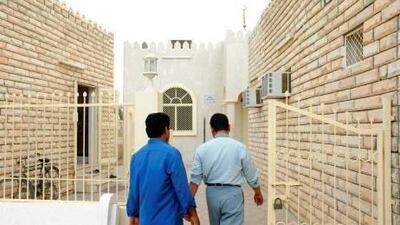DIBBA, FUJAIRAH // A castle of battlements and turrets may seem out of place in a sleepy fishing area. It is stranger still when 300 men are seated outside its pink stone walls.
But in this case, those towers are a minaret, a woman's prayer room and an imam's house. The masses outside are worshippers breaking their fast and the fortress-like structure is the wall to a mosque that is always open to the neighbourhood.
The mosque and the meals are the work of Ali Obaid, a former imam who runs pilgrimage tours to Mecca. He lives with his two wives and 19 children next door to the mosque in a house decorated with posters and carpets of Sheikh Zayed, the founding President of the UAE.
The call to prayer reverberates through his house five times a day, and that is the way Mr Obaid likes it. He built the mosque and his spacious house when the neighbourhood was no more than three houses. As the area has grown, so has the charity offered by the Obaid family.
Neighbours are not as impressed by the mosque's mock medieval design added in 2001 as they are by its founders. To know the Hateb bin Amru Mosque is to know the Obaids.
"Of all the people who come here, it's them who give food," says the mosque's Mauritanian imam, Sheikh Ahmed Jiddu. "They are the ones who made this mosque, who buy food for people in all the days of Ramadan and they give money to the poor - sometimes 10, sometimes 50, sometimes five. Every day after prayers they give something."
The giving starts at 6pm when Mr Obaid's sons turn the streets outside their house into an open-air dining hall for 300. They roll out carpets and start to carry out bottles of water that fill their majlis during the month of Ramadan. Inside the house Mr Obaid's wives and daughters put the finishing touches to the food they have been cooking all day. It is just as well that Mr Obaid has a big family, because charity is big work.
Mothers and maids cook the main course while daughters, Sheikha and Khawala, take care of the rest. They are 23 and 22, but the sisters are twins in all other respects.
"Daddy made this mosque," says Khawala, an education student at the Fujairah Women's College. "This mosque is for all neighbours from all countries. Some are rich and some are poor but all of us are the same. Every day we cook for them."
What do they enjoy cooking? "Sweets," say the sisters, eyes alight. They show their morsels on their mobile phones: ghorayebah almond cookies dotted with pistachios; kanafeh, a shredded pastry; and the Emirati favourite of qimat dumplings with date syrup.
"And pizza," says Sheikha. "I like too much pizza."
"We know that Allah watches when we cook," says Khawala. "We remember Allah all the time."
Their father, the son of a pearl diver, graduated in Islamic studies from Zayed University in the 1980s and runs a Haj and Umrah guide company. This week Mr Obaid's house was filled with sacks of potatoes and rice as he prepared for a bus trip.
"He's so active, he doesn't sit for a moment," says Khawala, who takes after her father. The sisters also make gift bags for worshippers that contain miniature prayer beads and CDs of Quran recitation.
Sheikha keeps her siblings busy in the evening with a game won by reading verses of the Quran.
"My best friend is the Quran," she says. "It's better this month not to be sleeping. It's better to be fasting and reading the Quran."
Sheikha graduated in a pharmacy course at Ajman University, but plans to follow her father's path and study Quran recitation in Fujairah so she can lead prayers for women.
A women's room was added to the mosque in 2001. Before that women from the neighbourhood prayed at the Obaid majlis while the men prayed at the mosque next door.
The family is as relaxed as they are devout. Sheikha and Khawala have effusive energy throughout the day as they fast, but insist on giving water and cups of red jelly to non-Muslims who visit them.
"It's a family that is very good," says Sheikh Ahmed, who lives next door with his son Mohammed, 14. "Their hearts are very pure."

